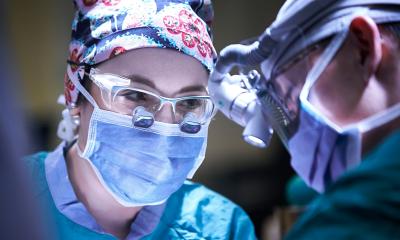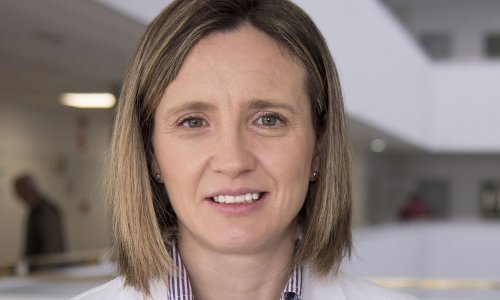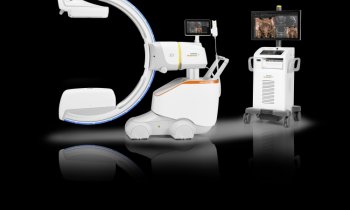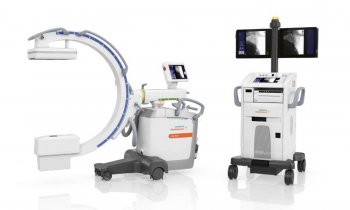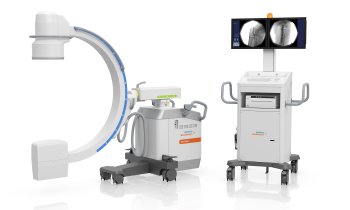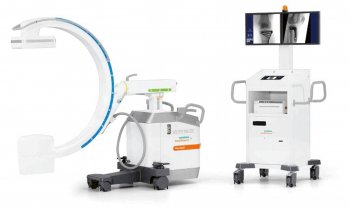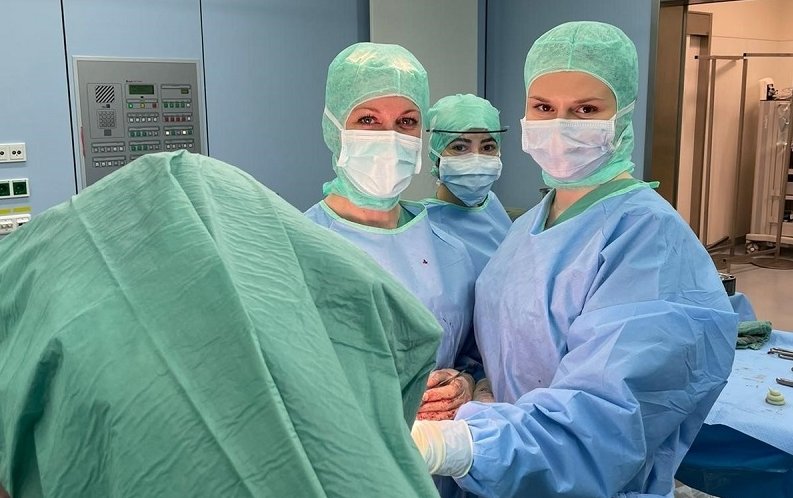
Source: Annika Hättich
Article • Women in surgery
Skull & bones? Female specialists fear not
In the past few years the number of women going into orthopaedics and trauma surgery has increased. Currently, 25% of the junior physicians in Germany are female – which in international comparison puts the country in one of the top spots. However, after their initial years many of them do not complete specialist training, only 5% of head of department positions in German university hospitals are held by women and not even 10% of orthopaedics professors are women. Annika Hättich, specialist physician for orthopaedics and trauma surgery at the University Hospital Hamburg-Eppendorf, wants to change that: her aim is to make her discipline more attractive for women and to improve equal opportunity.
Article: Sonja Buske
Orthopaedics and trauma surgery are still often considered ‘men’s work’ – backbreaking jobs with extremely hard physical work and brute force. Many women, afraid of failing in the OR because of lack of physical strength, body size or physique, forego this discipline. A groundless fear, as Annika Hättich underlines. She points out that in her eight years in the OR at most five times she found herself physically incapable of performing the surgery at hand. ‘No doubt, you start to sweat.
But that happens in every discipline. After all, stamina is something one can train. In addition, you are never alone in the OR. If indeed you falter, there is always someone on the surgical team to support you. ’Moreover, the length of orthopaedic surgery has been decreasing steadily as Hättich explains: ‘In the older days ten hours in the OR was no exception but today with modern technology and minimally invasive procedures surgery takes about two hours on average.’
OR schedules and part-time jobs are compatible
Shorter surgery times are important with regard to compatibility of family and profession as a two-hour procedure can be integrated much more easily into a part-time schedule than ten hours. But few hospitals offer part-time models. ‘Unfortunately, there is a persistent prejudice that part-time physicians don’t perform as well and miss too much,’ Hättich says and adds ‘in hospitals, however, where staff do not have to work overtime and where the heads of department make sure that work schedules are adhered to, the part-time staff are more satisfied and indeed often better performers.’ This does not apply only to mothers – increasingly fathers demand parental time off; they are no longer prepared to work full-time. The conditions that enable work/life balance have to be actively created.’
Family or career?
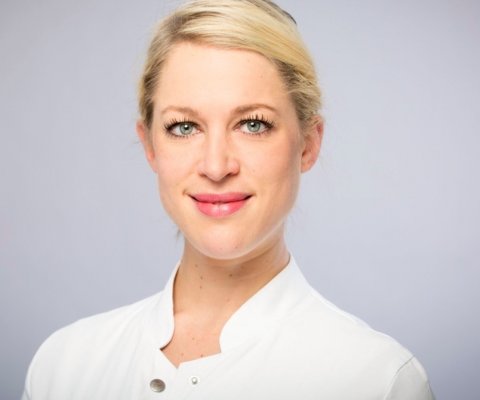
Hättich has seen many female colleagues throw in the towel: ‘Very often it is during the specialist physician training that a decision has to be made: do I want to start a family or do I want to stay on the career track towards senior physician or even head of department?’ Female physicians who opt for the family tend to abandon their specialist physician training or transfer to an off-hospital physician’s practice where work schedules are more compatible with being a mother. The Hamburg-based orthopaedist blames – among others – the lack of support for and by women: ‘Men support each other more, be it in mentoring programmes or in networks. While indeed there are a few universities that offer mentoring programmes for female surgeons – albeit not specifically in orthopaedics and trauma surgery – we women are such a minority that we have the feeling we have to fend for ourselves.’
This is where the Junges Forum O&U – a forum for junior physicians in orthopaedics and trauma surgery – comes in. The group was founded about 20 years ago to represent the interests of the young generation of orthopaedists and trauma surgeons. Hättich is heading the chapter dealing with support for junior physicians and she is involved in issues surrounding training, family and career, science and interdisciplinary cooperation. While both men and women are targeted, the majority of members as well as leaders are women.
A topic which is close to Hättich’s heart is surgery during pregnancy – which has long been a taboo. ‘Today, studies confirm that under certain conditions working in the OR is not associated with particular risks for pregnant women,’ Hättich explains and ads that ‘when no gas and x-rays are involved there is no reason to exclude pregnant surgeons. Many of my pregnant colleagues are indeed grateful for the opportunity to perform surgeries because thus they lose less time during their further training.’ In early 2021, another organisation was founded to provide a platform for female surgeons to exchange knowledge and experiences. Die Chirurginnen – the female surgeons – arose from the women‘s desire to network, to learn from each other and to grow together.
Working as a team – on equal terms
Hättich wants the women to organise, to find ways to be more visible and to further their careers. Nevertheless: ‘Our aim is to work in a team and on equal terms, no matter which time model. We want the team to function as a unit rather than being split into different groups with differing interests.’ Annika Hättich herself has successfully taken the next step: as of 1 July she will be senior physician.
Profile:
Annika Hattich is specialist physician for orthopaedics and trauma surgery at the University Hospital Hamburg-Eppendorf where on 1 July 2021 she will assume her new responsibilities as senior physician. She has been an active member of the Junge Forum O&U since 2013 and will be chairing the organisation as of summer 2021.
17.06.2021



